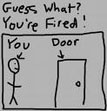Working For TIPS and the Downsides of The Miami Service IndustryDefinition of TIPS:
 I have mentioned many times on this site the great advantages there are to obtaining some sort of job in the service industry when living in Miami. But while the service (or as some call it, hospitality) industry provides a wealth of opportunities for quick cash, and a great way to keep some sort of income if you move here unemployed, there are a good deal of unfortunate consequences with which you must contend if you choose to make money off of other people’s tips. No, I am not talking about the semi-reputable characters with which you must associate, nor am I bemoaning the incompetent bosses, the unruly customers or the semi-incestuous social circles. No, these are mere personal aggravations. Some things you don’t even consider make the service industry a tough place to call home.  YOU ARE COMPLETELY EXPENDABLE While it is wholly common to be able to stroll the streets of South Beach and find yourself good employment in one day, it is just as easy to lose a job as it is to find one. Turnover is so high among servers, bartenders and support staff that anyone who has been at an establishment more than a couple of years is considered an “old-timer.†If they need people and you talk to the right manager on the right day you should be picking up shifts within a week. The downside is that if you do one thing wrong, and a manager doesn’t like you, you are gone. That doesn’t mean you have to constantly walk on eggshells, but there isn’t much consequence to getting rid of you when you can be replaced by noon the next day. You may be raking in $2000 a week - and getting used to that lifestyle- then walk into work one day to have your manager tell you that some relative of the owner didn’t get his Diet Pepsi fast enough from you last Tuesday and so they have to let you go. And there is not a damn thing you can do about it.  LABOR LAWS? WE DON’T NEED NO STINKING LABOR LAWS! Do labor laws apply to bars, restaurants and hotels? Of course they do. Then again, traffic laws also apply to drivers in Miami-Dade County. And are either ones followed with much respect? No, not at all. For those not familiar, the federal minimum wage act provides an exception for tipped employees. The theory is that the company can pay you a lower-than-minimum wage because when your tips are factored in you make more than $6.25 an hour (or whatever it is in your state). They instead establish what is known as “restaurant minimum,†which in Florida is $3.30 an hour. Some more enlightened states still require hospitality businesses to pay their employees minimum wage, but in a state so dependent on tourist dollars Florida wants to be able to keep costs as low as possible for everyone. Or the hotels just have a really good lobby. Probably the second one.  For the most part, this works well as few servers, bartenders, bellman or strippers are going to make less than $3 in tips every hour. If your tips are high enough (which most people’s are) your average paycheck for a 40-hour workweek will be about $2.50. This is because that money is used to pay the taxes on your tips. However, if you are unfortunate enough to get a job at an establishment that is not exactly wearing out the cash register, you may find yourself working an 8-hour shift for what amounts to about $40. While some bars will pay people more to work slow shifts (some as much as $15 an hour) many will not, and leave their employees holding the proverbial bag. For that kind of money, you may as well answer phones or file papers. At least then you can sit down once in a while.  Because lord knows in the service industry you will never be off your feet. You see, when you work in this business you do not get breaks. Yes, it is mandated by the federal government that you get a 15-minute break for every four hours worked, but tell that to the manager with a dining room full of hungry people who is short a server because somebody called off. Theoretically, an employee could demand one and take 15 minutes off in the middle of a rush to smoke or make a phone call, but they would more than likely be fired before their next shift. Is that legal? Of course it’s not legal. But it is exponentially easier to find a new restaurant job than to file a lawsuit for wrongful termination. And really, when you are on the other side and sitting there eagerly awaiting the ketchup your waiter forgot, do you really want to hear they are on a break for the next 15 minutes?  It is also not at all uncommon to be asked to work more than 40 hours in a week. This may not seem so tough for those desk jockeys out there who put in 60-hours on the grueling phone or the oppressively hot copy machine, but for folks who run around every minute they are on the clock in can be rather demanding. Are the restaurants required to pay overtime like regular companies? Of course they are. But paying time and a half to a guy making $3.30 an hour is not exactly a financial disincentive to working your people to death. And a lot of places will fire you if you don’t work a few double shifts every week. Is that legal? Of course it isn’t. But again, few in the industry care enough to pursue action, nor know enough about the law to know that they can.  BY BENEFITS I MEAN YOU GET 15% OFF YOUR CHECK We all know a good many people in America do not have health insurance, and those in the service industry are among them. The only people I have ever met who worked in restaurants who had health insurance were either married or in college, meaning they got it through their spouse or their school. In California, they actually have a union for hotel and restaurant employees that offers medical, dental, 401K and all those other nifty things that salaried employees get. But that’s California. They are on the verge of establishing a union for illegal immigrant workers so it’s kinda hard to hold them up as an example. The point is that a lot of things that others get at as part of their job are not included for those working for cash. Most people in the industry are young and therefore do not concern themselves with things like insurance. Of course most of them tend to drink a lot and dabble in illegal substances while working odd hours and partying excessively. So maybe they should (learn more).  TIME OFF IS GREAT. MONEY OFF IS NOT Even if you do have health insurance, should you find yourself injured you will be lucky if your employer even keeps you on. That is to say if you get injured and are unable to work, you will be taken off the schedule and all of your shifts will be taken by someone else. When you heal, the new people may very well not want to give up their shifts and you may be stuck either looking for another job or working Tuesday afternoon lunch for a few months. If you have been somewhere a while (“a while†meaning 10-12 months in this business) they will often give you your schedule back if you are a good employee. But that is, again, if you are lucky. If you can’t work, even if you are promised your job back when you recover, you make no money. That’s right; waiters don’t get sick pay. So even if job security is not an issue, having money will be. Your employer may be sympathetic, but no one is going to say “gosh, Timmy, that sucks you broke your leg. Here’s what you would have made this week in cash. We’ll keep this up until you can work again.†So what happens? You keep working and your injury never heals, that’s what happens. I have a friend in Chicago who bartends and broke her foot back in mid-April. And she has not missed a shift because of it. And her foot? Probably worse than it was the day it was injured. But can you blame her? Having a messed-up foot sure beats the hell out of being homeless. The same thing applies to vacations. Yeah, generally you can get time off whenever you want it. But that week-long cruise to Bahamas will not only set you back a thousand dollars for the trip, it will also cost you the thousand bucks you would have made at work. Accounting-types call this “Opportunity Cost”. Those in the service industry just call it “shitty.†So while there is a good deal of freedom involved in only being paid for when you work, there is that nasty downside of losing money every time you decide to have fun.  WHERE DID ALL THE TOURIST DOLLARS GO? During the winter and spring, a server or bartender can make $1000-$2000 a week without working more than 30 hours. People working at high-end clubs or high-volume bars can make a grand in a night and not have to work the rest of the week. So you have a lot of time to go out and blow the large amounts of cash you have lying around. This is all well and good until summer rolls around and that shift that used to net you $1000 is now getting you $350. Your income has been slashed by two-thirds and in all your drinking and shopping you forgot to save money. So now you are scratching by to make rent and begging your manager to work a double shift on Monday so you can keep your power turned on. Such is life in the service industry. The cash may be good, and you may think it’ll go on like that forever, but in this town when summer rolls around the money rolls away. You have to save.  The end of the year also provides a nice little financial hit for those who bother doing their taxes. Yes, while that $3.30 an hour did take care of some of what you owe Uncle Sam, if you reported even half of what you really made (this is generous for most) you are going to end up owing a lot. Like in the thousands of dollars. Most employers only report your credit card tips or, if those are too low, about 11% of your sales as your tipped income. When your paycheck comes back it looks like most of the taxes got taken out. But that is not the case. You actually are going to owe more and the few law-abiding servers and bartenders who do their taxes right find themselves with a nice big tax bill in the spring. Fortunately, that’s when the money starts rolling in again. While it may seem like the money in this business is great when you first get in, you will soon find that it only nets you a little more than your office-dwelling counterparts. Sure, you get more time off, more cash and less stress once you leave, but your income is erratic and your job security is tenuous at best. Like all things in life, there are advantages and disadvantages to working for tips, and for some the roller-coaster that such a lifestyle provides is perfect. Waking up at noon every day might be nice, but not when your first thought is “I hope I’m still on the schedule.†The lure of easy money is attractive, but you have to know the downsides before you jump in head-first. This is not the corporate world, folks, it’s the service industry. And you have to be a little bit nasty to survive.
You Deserve More Than an Ordinary Vacation.
Travel with Miami Beach 411 Today!
The Miami Beach 411 Travel Store is Open 24/7.
6 Comments on"Working For TIPS and the Downsides of The Miami Service Industry"
|

Like what you see? Let's talk about how
we can help your vacation --> Contact Us |
|
Like what you see? Let's talk about
how we can help your vacation
--> Contact Us
how we can help your vacation
--> Contact Us















Gus says:
Great article, Matt. You got to be nasty, or thick skinned. It’s also very important to work hard at getting along with all of your co workers. Not just the others in your peer group. If you’re working in a restaurant and you don’t get along with the back of the house, or the bar, you’re dead.
One nasty thing I’ve seen management do is shave hours off their employees time cards. That’s not very nice even if you’re only making $3.30. (Steve Haas, I’m looking at you)
Inappropriate sexual behavior is also more common compared to the restaurants I’ve worked in Chicago and LA.
As you pointed out, one good thing about working in the Miami Service Industry is being able to leave and come back next season.
My favorite line of yours is this…
“it is wholly common to be able to stroll the streets of South Beach and find yourself good employment in one day”.
There’s no other city in the United States where finding a service industry job is as easy.
Thank you.
Posted on 07/12/2007 at 7:14 AM